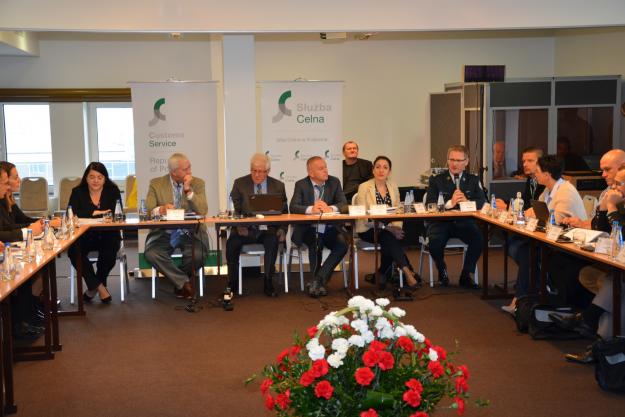
Participants to a regional training course on the technical aspects of the CWC’s transfers regime.
Customs officials from Eastern Europe have gained practical knowledge that will enable them to play a more significant role in upholding the global ban on chemical weapons, through the Chemical Weapons Convention’s (CWC) cross-border transfer regime.
This knowledge was gained through a regional training course run by the Organisation for the Prohibition for Chemical Weapons (OPCW) and the National Authority of Poland, and took place in Cracow, Poland, on 27-30 September.
“Customs authorities are the main, and often sole, source of information about imports and exports of scheduled chemicals. Subsequently, these authorities are crucial to fulfilling countries’ obligations under the CWC,” Vaclovas Semaskevicius, OPCW’s Implementation Support Officer, underscored in his opening remarks to participants.
“Their work is vital to preventing the re-emergence of chemical weapons and reassuring States Parties that scheduled chemicals are not being diverted for prohibited purposes,” he added.
The four-day course encouraged its thirty-two participants to delve into CWC provisions that regulate chemical transfers, and controls that surround cross-border movement of scheduled chemicals. Relevant rules regarding the Harmonised Systems Convention under the World Customs Organisation were also reviewed.
Throughout the course, attendees discussed their own experiences and offered possible solutions to practical and technical challenges in one another’s daily work. The most popular topics of debate included the control of CWC scheduled chemicals in ports and free zones, risk assessment, trans-shipments and software for customs services.
Training scenarios simulated situations connected with identifying CWC scheduled chemicals and import and export procedures. In addition to these, attendees received OPCW reference materials, such as the Handbook on Chemicals, the Online Scheduled Chemicals Database and a Brochure on Most Traded Scheduled Chemicals.
Sixteen OPCW States Parties were represented by the course’s participants, including Albania, Armenia, Belarus, Czech Republic, Georgia, Hungary, Kyrgyzstan, Lithuania, former Yugoslav Republic of Macedonia, Montenegro, Poland, Romania, Serbia, Slovakia, Ukraine and Uzbekistan.
For more details:
Chemical Weapons Convention – Annex on Implementation and Verification
